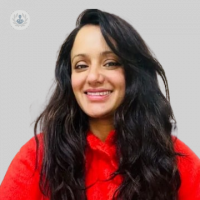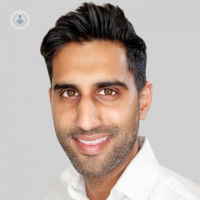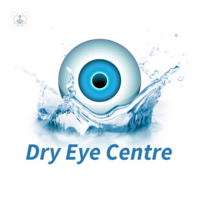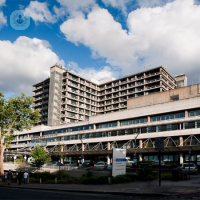What is orthoptics?
Orthoptics is the study, diagnosis and non-surgical management of patients with symptoms relating to eye misalignment and focusing problems. Hence, orthoptists treat patients whose eyes are not working together properly (i.e. binocular vision). Orthoptists treat adults, children and infants, however, as binocular vision conditions often mostly affect children, most orthoptists work in a paediatric setting.
What conditions does an orthoptist treat?
Conditions that are commonly treated by an orthoptist include:
- Double vision
- Droopy eyelids (ptosis)
- Strabismus (squint)
- Amblyopia (lazy eye)
- Nystagmus (wobbly eyes)
What tests might an orthoptist carry out?
Orthoptist tests are designed to assess eye alignment, movement and binocular vision. Common orthoptist tests include:
- Eye movement tests – these assess the movement of your eyes in different positions.
- Cover test – to diagnose strabismus or misalignment.
- Visual acuity test – tests your vision in each eye.
- Stereopsis tests – assesses your 3D vision and your ability to perceive depth.
What treatments does an orthoptist provide?
Common treatments or tools used by an orthoptist to treat orthoptic conditions include optical devices (e.g. patches or lenses) and specialised orthoptic exercises. Certain conditions diagnosed by an orthoptist may be referred to an ophthalmologist for surgical treatment.
01-08-2019 05-30-2024Orthoptics
What is orthoptics?
Orthoptics is the study, diagnosis and non-surgical management of patients with symptoms relating to eye misalignment and focusing problems. Hence, orthoptists treat patients whose eyes are not working together properly (i.e. binocular vision). Orthoptists treat adults, children and infants, however, as binocular vision conditions often mostly affect children, most orthoptists work in a paediatric setting.
What conditions does an orthoptist treat?
Conditions that are commonly treated by an orthoptist include:
- Double vision
- Droopy eyelids (ptosis)
- Strabismus (squint)
- Amblyopia (lazy eye)
- Nystagmus (wobbly eyes)
What tests might an orthoptist carry out?
Orthoptist tests are designed to assess eye alignment, movement and binocular vision. Common orthoptist tests include:
- Eye movement tests – these assess the movement of your eyes in different positions.
- Cover test – to diagnose strabismus or misalignment.
- Visual acuity test – tests your vision in each eye.
- Stereopsis tests – assesses your 3D vision and your ability to perceive depth.
What treatments does an orthoptist provide?
Common treatments or tools used by an orthoptist to treat orthoptic conditions include optical devices (e.g. patches or lenses) and specialised orthoptic exercises. Certain conditions diagnosed by an orthoptist may be referred to an ophthalmologist for surgical treatment.


How an orthoptist can help you?
By Ms Safina Rashid
2025-01-26
Orthoptics plays a vital role in the realm of eye care, offering specialised assessments and treatments for a variety of vision disorders. If you're experiencing vision concerns or have been diagnosed with conditions such as strabismus or amblyopia, consulting with an orthoptist can be a crucial step towards improving your visual health. Leading orthoptist Ms Safina Rashid delves into this field of medicine. See more
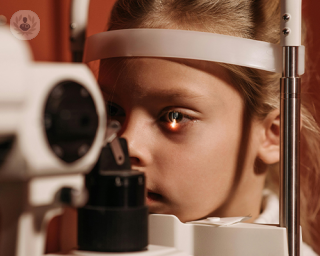

Paediatric strabismus care: how orthoptists and vision therapy improve eye alignment
By Mr Jayesh Khistria
2025-01-25
Strabismus is a condition where the eyes are misaligned – for example, when looking straight ahead, one eye may be fixed to the correct point, but the other could be turning inward, upward, downward, or outward. Strabismus has several possible causes, which can occur later in life, or patients can be born with it (which is called congenital strabismus). In this article, a leading orthoptist shares how strabismus can be treated using vision therapy and orthoptics. See more
Experts in Orthoptics
-
Mr Connan Tam
OptometryExpert in:
- Orthoptics
- Keratoconus
- Gas permeable contact lenses
- Dry eye
- Myopia
- Visual stress (Meares-Irlen syndrome)
-
Ms Safina Rashid
Healthcare professionalsExpert in:
- Vision therapy
- Amblyopia
- Diplopia (double vision)
- Glaucoma
- Strabismus (squint)
- Headache
-
Mr Jayesh Khistria
Healthcare professionalsExpert in:
- Orthoptics
- Strabismus (squint)
- Amblyopia
- Paediatric ophthalmology
- Neuro-ophthalmology
- Diplopia (double vision)
- See all

Dry Eye Centre
Dry Eye Centre
7 Devonshire St, London W1W 5DY, United Kingdom
No existe teléfono en el centro.
By using the telephone number provided by TOP DOCTORS, you automatically agree to let us use your phone number for statistical and commercial purposes. For further information, read our Privacy Policy
Top Doctors

Burnett Hodd & Tam Optometry
Burnett Hodd & Tam Optometry
7 Devonshire St, London W1W 5DY, United Kingdom
No existe teléfono en el centro.
By using the telephone number provided by TOP DOCTORS, you automatically agree to let us use your phone number for statistical and commercial purposes. For further information, read our Privacy Policy
Top Doctors

The Royal Free Hospital
The Royal Free Hospital
Pond Street, Hampstead. NW3 2QG
No existe teléfono en el centro.
By using the telephone number provided by TOP DOCTORS, you automatically agree to let us use your phone number for statistical and commercial purposes. For further information, read our Privacy Policy
Top Doctors
-
Dry Eye Centre
7 Devonshire St, London W1W 5DY, United Kingdom, West LondonExpert in:
- Contact lenses for dry eyes
- Dry eye
- Optometry
-
Burnett Hodd & Tam Optometry
7 Devonshire St, London W1W 5DY, United Kingdom, West LondonExpert in:
- Complex eye conditions
- Vision correction
- Optometry
- Lens replacement
-
The Royal Free Hospital
Pond Street, Hampstead. NW3 2QG, Central LondonExpert in:
- General Surgery
- Orthopaedic surgery
- Robotic Surgery
- Dermatology
- Obstetrics and Gynaecology
- Paediatrics
- Most viewed diseases, medical tests, and treatments
- Visual impairment
- Diabetic retinopathy
- Retina
- Visual stress (Meares-Irlen syndrome)
- Presbyopia
- Nystagmus
- Myopia
- Hyperopia (farsightedness)
- Eye examination
- Demodex


